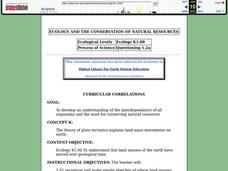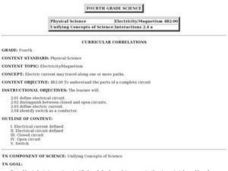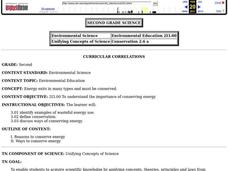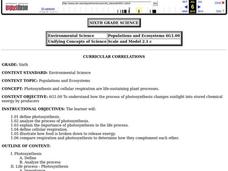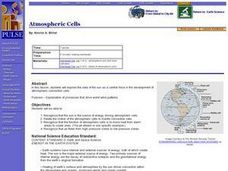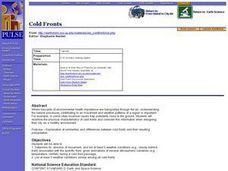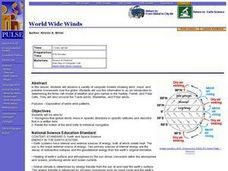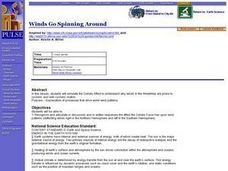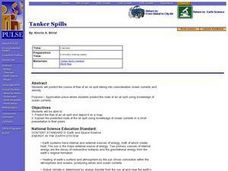Curated OER
Ecology And the Conservation of Natural Resources
Students study Alfred Wegener's theory of continental drift and how the continents were connected in one large land mass called Pangaea. They examine plate tectonics and the theory that the earth's surface is composed of large moving...
Curated OER
Sing Along with the Muscles Song
Students review the muscles of the body. They perform the functions of the muscles of the body to the tune of "Rudolph the Red Nosed Reindeer".
Curated OER
Exploring Animal Habitats: Winter Changes
Students explore animals during the winter months. They discuss the changes that animals make during winter in order to survive. Students discuss migration, hibernation, and staying active during winter months. Students create various...
Curated OER
What Plants Need
Students plant seeds in milk cartons, over the next two weeks, they watch the plants closely to see how they grow and change. They keep a photo journal to record the growth of the plant.
Curated OER
Simple Machines
First graders discuss work, force, and energy. They study how work is done. Students discuss various types of work that are done. They act out how work is done. Student draw pictures of types of work they have done.
Curated OER
Paths of Electrical Currents
Fourth graders examine the paths that electrical currents travel. They create a current of electricity using flashlights, bulbs, batteries, wires and tape. They determine how to create a closed circuit that will light the bulb. They...
Curated OER
Heat and Light Come From Various Sources
First graders study heat and light and how they come from various sources. They list sources of heat and light and identify the different energy sources as heat, light, or both heat and light.
Curated OER
Matter
Fifth graders investigate the structure of matter. They examine pictures of atoms and molecules and discuss their relationships, and construct a model of a molecule using toothpicks and gumdrops.
Curated OER
Plant Parts and Functions
Fifth graders examine two or three unfamiliar flowers or fruits, such as eggplant and mango and realize that each flower or fruit comes from a flowering seed plant. They then identify the plants.
Curated OER
Animals
Second graders define and describe the characteristics of a mammal and a mammal's importance to man. They also describe the life cycle of a frog and compare and contrast a larva and an adult frog. Finally, 2nd graders study and explain...
Curated OER
Energy Conservation
Class is divided into groups of 2-4 students. They then are given a list of 36 items that are found in our homes and which use electricity. They are going to pretend that because of an energy shortage, they have to pick only twelve items...
Curated OER
Rock Cycle
Third graders identify various types of landforms of the United States. They discuss earth movements that produce geologic structures and landforms and define cycle as it relates to rocks and soil. They demonstrate the processes forming...
Curated OER
Motions and Forces
Sixth graders investigate the construction of a magnet and the force it produces. They identify various materials as magnetic or non-magnetic, discuss the properties of magnetic properties, and conduct an experiment with a compass and...
Curated OER
Photosynthesis
Sixth graders are introduced to the process of photosynthesis by discussion and then by participating in an experiment. They then answer questions as independent practice project.
Curated OER
Atmospheric Cells
Learners recognize that the sun is the source of energy driving atmosphere cells. They relate the motion of the atmospheric cells to mantle convection cells. Students recognize that the function of atmospheric cells is to move heat from...
Curated OER
Cold Fronts
Students determine its' direction of movement, and list at least five weather conditions associated with the specific front, given animations of several atmospheric variables during a cold front passage. They list at least three weather...
Curated OER
World Wide Winds
Students recognize that global winds move in specific directions in specific latitudes and describe that in a written form. They relate the motion of the wind belts to historical navigation.
Curated OER
Winds Go Spinning Around
Students simulate the Coriolis Effect to comprehend why winds in the Westerlies are prone to cyclonic and anti-cyclonic motion. They arrive at an explanation of processes that drive world wind patterns
Curated OER
Tanker Spills
Students predict the flow of an oil spill and depict it on a map. They explain the predicted route of the oil spill using knowledge of ocean currents in a short presentation to their peers.
Curated OER
Planet Oit!
Twelfth graders use this game to find minerals given rocks and outcrops in a plausible (but not real) geologic setting. They play without outside encouragement for hours as the world is fun to explore and the scoring system encourages...
Curated OER
Rock, Soil, or Water?
Students participate in an activity in which they identify properties of water, soil and rocks. They work together to identify different types of rocks. They ask questions to complete the lesson plan.
Curated OER
Air and Water in the Environment
Second graders participate in a three part lesson in which they identify and describe forms of moisture in the environment. Part one of the lesson involves the three stages of the water cycle, part two focuses on creating humidity by...
Curated OER
Acid Rain
Students use real-time weather maps to determine the likelihood of acid rainfall in a region. Students apply their understanding of interaction between weather systems, land and air pollution, to address acid rain and the effects on...
Curated OER
Heat Unit
Students define thermal equilibrium. They distinguish between internal energy and heat. Students describe how the quantity of heat that enters or leaves a substance is measured.


